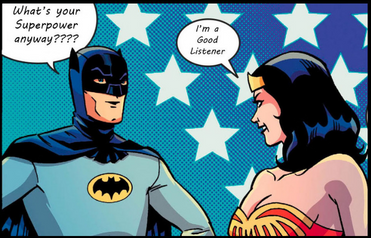Active Listening is a Superpower
16/07/2021Listening to a friend in Crisis or under Stress
When someone is distressed, one of the most powerful things you can do is help them talk through their problems & feelings. Key to this is to encourage them to talk and then to actively listen to what they are telling you.
Thanks to Covid and the cost of living crisis, recent years have been stressful for so many of us who have faced and are facing loneliness, isolation, loss of control, financial hardship, or bereavement. At times, little could be done to change these situations e.g. at the height of the pandemic. But as a result, many more of us understand or have experience of mental health issues.
Yet still, often people under stress don’t reach out to others. They may be concerned about burdening others with their problems or may mistakenly believe that they somehow appear “weak” by asking for help or support. Many can be frustrated or upset or may only be able to communicate in angry outbursts. Meanwhile, friends and family sometimes feel uncomfortable when someone reaches out because they simply don’t know how to help or what to do.
For someone under stress or in crisis, having someone who genuinely listens to them can play a critical role in reducing and managing their stress.
Most people equate listening with hearing – if we’re hearing sounds, we’re listening. But there’s a bit more involved in ACTIVE listening. It’s done with purpose. Hearing is passive but listening is active.
Why is active listening important in mental health?
We all like to know that we are being heard and understood and listening shows respect. For someone in distress, being able to unbuden themselves to someone who they can see is listening to them and appears to be understanding them, is a great first step. Listening is the key to effective communication. It validates the speaker. So, if we actively take in both what the person is saying, and the emotions behind the message, we’re fostering trust and mutual understanding. As a result, the speaker is more likely to be open and honest if they know they’re speaking to an empathetic, active listener.
What to say
To be an active listener you also need to ask questions that encourage the speaker to open up. So we’ve taken our lead from the Samaritan’s model and set out below some tips:
- Open Questions: ask questions that don’t require a Yes/No answer. For instance, instead of “Does this upset you?” try ‘How does that make you feel?”Summarise: this helps to show you have listened & understood what the person is experiencing e.g. “So, you feel like your partner doesn’t understand you.”
- Reflect: simply repeating back a key word or phrase encourages the person to expand on what they’ve said. You may respond to “I’ve been having a really tough time” with “A tough time?” By doing this, you encourage the speaker to continue.
- Clarify: If they gloss over an important point or feeling, “Tell me more about….” can help the person clarify these points for themselves.
- Short Words of Encouragement: They may need help to continue with their story. So, a simple “yes”, “go on”, “I see” may help the person continue and shows you are interested.
- React: The person is often seeking empathy & understanding. So reactions such as “That must have been difficult”, “You’ve had a bad time” can help. Reacting is a simple human touch that is a vital part of building rapport & trust at a difficult time.
Other helpful hints
- Try not to think ahead about what you will say.
- Do your best not to ignore or deny the other person’s feelings.
- It’s important to not talk about yourself or change topics.
- Try not to advise, diagnose or criticise.
- Don’t pretend you have understood if you haven’t.
Sign up to our newsletter
